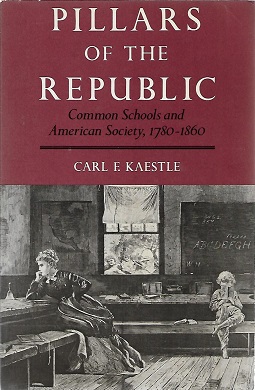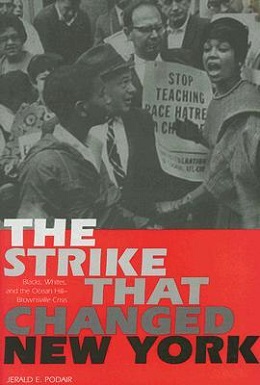
Pillars of the Republic is history book on the origins of the American common schools written by Carl Kaestle and published by Hill & Wang in 1983.

The Elusive Ideal: Equal Educational Opportunity and the Federal Role in Boston's Public Schools, 1950–1985 is a social history book written by Adam R. Nelson on the relationship between the Boston public schools and local, state, and federal public policy in the mid-20th century. The University of Chicago Press published the title in May 2005.
Laurence Russ Veysey (1932–2004) was a historian best known for his history of higher education, The Emergence of the American University. He also wrote The Communal Experience.

The Modern School Movement: Anarchism and Education in the United States is a history book about Ferrer Schools by Paul Avrich.

Huck's Raft is a history of American childhood and youth, written by Steven Mintz. The 2006 H-Net review wrote that the book was the best single-volume history of its kind.
Milton Gaither is an historian of education and a professor at Messiah College. Some of his most notable works include American Educational History Revisited, on the historiography of American education, and Homeschool: An American History.
Preschool Education in America: The Culture of Young Children from the Colonial Era to the Present is a 1995 history of preschool education in the United States written by Barbara Beatty.

Self-Taught: African American Education in Slavery and Freedom is a book that tells the history of African American self-education from slavery through the Reconstruction Era. It was written by history professor Heather Andrea Williams and published in 2007 by the University of North Carolina Press.
The Troubled Crusade: American Education, 1945–1980 is a 1983 history book by Diane Ravitch that describes the postwar progressive education movement and American school reform of the mid-20th century.

The Strike That Changed New York is a history book about the New York City teachers' strike of 1968 written by Jerald Podair and published by the Yale University Press in 2004.
Paul Goodman (1934–1995) was a historian of American and Jewish history, and professor emeritus at the University of California, Davis.

The Communal Experience: Anarchist and Mystical Counter-Cultures in America is a book-length historical and sociological study of cultural radicalism in the United States, written by historian Laurence Veysey and published in 1973 by Harper & Row.
The Transformation of the School: Progressivism in American Education, 1876–1957 is a history of the American Progressive Education movement written by historian Lawrence Cremin and published by Alfred A. Knopf in 1961.

An Elusive Science: The Troubling History of Education Research is a history of American education research written by Ellen Condliffe Lagemann and published by University of Chicago Press in 2000.
Donald Harnish Fleming was Jonathan Trumbull Professor of American History at Harvard University. He specialized in American and European intellectual history and the history of science and medicine.
Casey Nelson Blake is a historian and the Mendelson Family Professor of American Studies at Columbia University. He has written Beloved Community: The Cultural Criticism of Randolph Bourne, Van Wyck Brooks, Waldo Frank, and Lewis Mumford (1990) and edited The Arts of Democracy: Art, Public Culture, and the State (2007).
Charles Vincent is an American historian, professor, and author. He a professor in the history department at Southern University in Baton Rouge, Louisiana since 2017. Vincent serves as director of the Mwalimu Institute.
David F. Labaree is a historian of education and Lee L. Jacks Professor of Education at Stanford University.

Yale: A History is a 1999 book written by Brooks Mather Kelley on the history of Yale University.
James Walter Fraser is an American educationalist, pastor, and academic administrator. He is a professor of history and education and chair of the applied statistics, social science, and humanities department at the Steinhardt School of Culture, Education, and Human Development. Fraser is dean of education at the University of the People. He is a past president of the History of Education Society. Fraser was the pastor at Grace Church Federated from 1986 to 2006.









